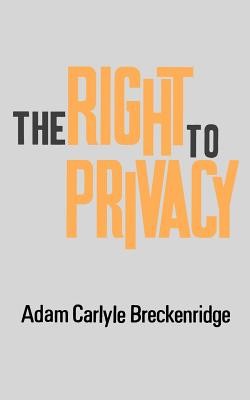
- We will send in 10–14 business days.
- Publisher: University of Nebraska Press
- ISBN-10: 0803262280
- ISBN-13: 9780803262287
- Format: 12.7 x 20.3 x 1 cm, softcover
- Language: English
- SAVE -10% with code: EXTRA
The Right to Privacy (e-book) (used book) | bookbook.eu
Reviews
Description
To what extent is the individual protected from arbitrary and unreasonable intrusions into his personal privacy by the Bill of Rights and the Fourteenth Amendment? The aim of Dr. Beckenridge's study is to answer this question, which is of such crucial relevance in America today.
The Right to Privacy is based upon the belief that the individual has the right to determine the degree to which he wishes to share of himself with others and has control over the time, place, and circumstances in which he communicates with others; that he has the right to withdraw or participate as he sees fit; and the right to control dissemination of information about himself. But since man lives in a community of others, inescapably he has the need to participate and communicate with others. When this apparent dichotomy is coupled with the recognized power of government, even in a democracy, to function for the public good, the question arises: to what extent and in what areas may an individual's personal affairs be exposed without his knowledge or consent?
Sooner or later it becomes the business of judges to determine the limits of individual privacy claims, and it is to the decisions and opinions of judges, primarily of the United States Supreme Court, that one must look to find the status of claims of a right to privacy--what has been called man's right to be let alone.
In determining how far the United States government has gone in invading the right to privacy--and what it has done to protect that right--the author examines recent court decisions, especially those of the United States Supreme Court, and some court opinions as they interpret the Bill of Rights and the Fourteenth Amendment. He also scrutinizes the extension or incorporation of the Rights into the Fourteenth Amendment, and the relation of police power to individual rights. This timely study also demonstrates that some rights are superior to others and that they come info conflict--conflicts which still have to be resolved.
- Publisher: University of Nebraska Press
- ISBN-10: 0803262280
- ISBN-13: 9780803262287
- Format: 12.7 x 20.3 x 1 cm, softcover
- Language: English English
To what extent is the individual protected from arbitrary and unreasonable intrusions into his personal privacy by the Bill of Rights and the Fourteenth Amendment? The aim of Dr. Beckenridge's study is to answer this question, which is of such crucial relevance in America today.
The Right to Privacy is based upon the belief that the individual has the right to determine the degree to which he wishes to share of himself with others and has control over the time, place, and circumstances in which he communicates with others; that he has the right to withdraw or participate as he sees fit; and the right to control dissemination of information about himself. But since man lives in a community of others, inescapably he has the need to participate and communicate with others. When this apparent dichotomy is coupled with the recognized power of government, even in a democracy, to function for the public good, the question arises: to what extent and in what areas may an individual's personal affairs be exposed without his knowledge or consent?
Sooner or later it becomes the business of judges to determine the limits of individual privacy claims, and it is to the decisions and opinions of judges, primarily of the United States Supreme Court, that one must look to find the status of claims of a right to privacy--what has been called man's right to be let alone.
In determining how far the United States government has gone in invading the right to privacy--and what it has done to protect that right--the author examines recent court decisions, especially those of the United States Supreme Court, and some court opinions as they interpret the Bill of Rights and the Fourteenth Amendment. He also scrutinizes the extension or incorporation of the Rights into the Fourteenth Amendment, and the relation of police power to individual rights. This timely study also demonstrates that some rights are superior to others and that they come info conflict--conflicts which still have to be resolved.


Reviews